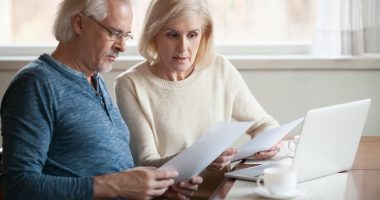THE UK economy has swerved a double dip recession – but it shrunk at its fastest rate in 300 years in 2020.
Gross domestic product (GDP) dropped by 9.9% over the course of the 12 months due to the coronavirus pandemic.
? Read our coronavirus live blog for the latest news & updates
The contraction in 2020 is the worst in modern records, with GDP first measured in the aftermath of the Second World War.
The record fall also wiped out seven years of economic growth, taking the economy back to its 2013 size.
Before GDP was officially measured, the worst yearly fall was estimated to have been 13% in 1709 thanks to the Great Frost, followed by a 9.7% drop in 1921.
But in better news for the economy, GDP was up by 1% for the last three months of the 2020 – October to December – meaning the UK has avoided a double dip recession for now.
It comes after the Bank of England’s chief economist said the UK economy is set to bounce back “like a coiled spring” after Brits saved up to £250billion during the coronavirus lockdown.
What this means for your personal finances
GROSS domestic product (GDP) is one of the main indicators used to measure the performance of a country’s economy.
When GDP goes up, the economy is generally thought to be doing well although today’s figures aren’t as strong as hoped.
Negative growth often brings with it falling incomes, job cuts and lower consumption.
The Bank of England (BoE) uses GDP as one of the key indicators when it sets the base interest rate.
This decides how much it will charge banks to lend them money, and is a way to try to control inflation and the economy.
So, for example, if prices are rising too fast, the BoE could increase that rate to try to slow the economy down. But it might hold off if GDP growth is slow.
The BoE cut interest rates twice in March due to coronavirus.
Base rate cuts means mortgage borrowers now typically benefit from lower rates, but at the other end of the scale savers earn less on their savings.
To measure GDP, the Office for National Statistics (ONS) collects data from thousands of UK companies.
Andrew Wishart, UK economist at Capital Economics, told The Sun the full impact of the crisis on jobs and businesses will only become apparent once the government starts to withdraw its support.
The research firm expects unemployment to double from 4 per cent to 8 per cent, with the same number of companies likely to go bust.
A double-dip recession is when the economy shrinks, briefly recovers, and then contracts again.
The UK economy would need to shrink again for two consecutive quarters – or six months – to fall into double-dip recession territory.
Last year saw the country plunge into the “worst ever” recession before bouncing back and growing by 15.5% in the three months to September.
On a monthly basis, the latest figures show GDP increased by 1.2% in December 2020, following a revised 2.3% decline in November.
Economists originally thought GDP had shrunk by 2.6% in November.
But experts say there is “still a mountain to climb” for the economy to fully recover from the pandemic.
The UK remains under tight lockdown restrictions with pubs, restaurants and non-essential businesses shut and holidays banned.
Chancellor Rishi Sunak said: “Today’s figures show that the economy has experienced a serious shock as a result of the pandemic.
“While there are some positive signs of the economys resilience over the winter, we know that the current lockdown continues to have a significant impact on many people and businesses.
“That’s why my focus remains fixed on doing everything we can to protect jobs, businesses and livelihoods.”
Susannah Streeter, senior investment and markets analyst at Hargreaves Lansdown, said: “The UK may have swerved a technical double dip recession, but the record breaking annual fall in economic output underlines the damage wreaked by Covid on businesses up and down the country.
“The economy is almost 10% smaller than it was before the pandemic hit.
“There is still a mountain to climb in this recovery and there will be a lot more pain to come given the current nationwide shutdowns.”
Speaking before the figures were released, Bank of England economist Andy Haldane said Brits will be keen to start spending again once after building up “accidental savings” of up to £250billion during lockdown.
He predicts people will be keen to spend big as restrictions are lifted, including on social occasions, holidays and meals out.
The economist said most people are now “desperate to get their lives, including their social lives, back” and will seize the opportunity to do so when it is allowed.
He wrote in an article for the Daily Mail: “The recovery should be one to remember, after a year to forget.
“A year from now, annual growth could be in double-digits.”
Before the latest lockdown restrictions were introduced, the economy was expected to grow in the first quarter of 2021.
But rising cases of coronavirus and a new mitant strain forced the government to act to save the NHS.
The pandemic has seen redundancies hit record highs as the unemployment rate rose to 5% with 1.72million people now out of work.
















